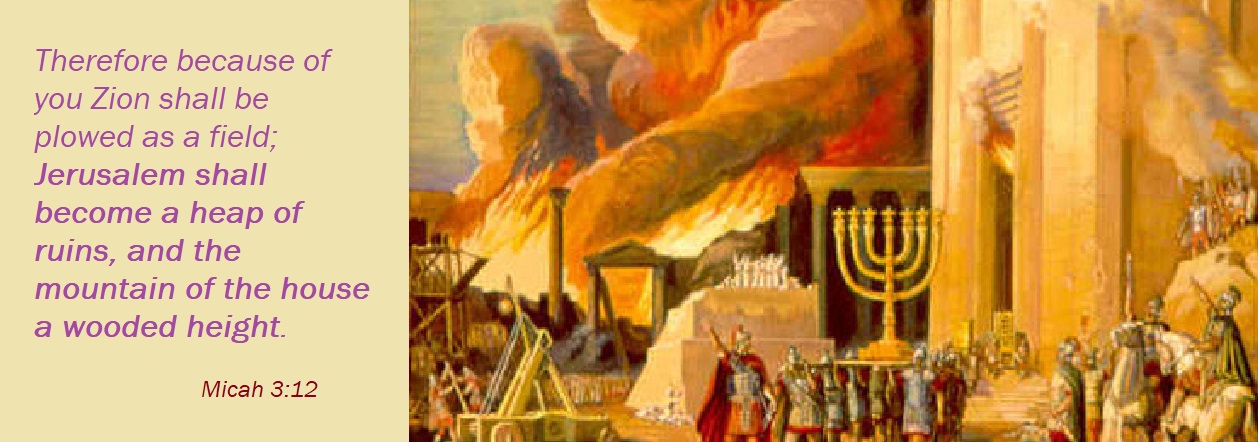
Biblical Evidence for the 1st Century Return of Christ
… parousiafulfilled.com
“For there will be great distress upon the earth [Gk: τῆς γῆς : tes ges : THE LAND] and wrath against THIS people [Gk: λαῷ τούτῳ : lao touto]. They will fall by the edge of the sword and be led captive among all nations, and Jerusalem will be trampled underfoot by the Gentiles, until the times of the Gentiles are fulfilled.” (Luke 21:23‐24)
“For then there will be great tribulation, such as has not been from the beginning of the world until now, no, and never will be” (Matt 24:21)
When God delivered the Hebrew nation out of bondage and slavery in Egypt, he rescued them for a purpose: so that they could be a holy people, set apart to love and serve him. He made a Covenant with them and commanded them to keep his laws and statutes:
“This day the Lord your God commands you to do these statutes and rules. You shall therefore be careful to do them with all your heart and with all your soul.” (Deut. 26:16)
God promised that, if Israel kept this Covenant, they would receive many blessings, prosperity and fruitfulness (Deut. 28:1‐14). However, if they broke this Covenant, the consequences would be dreadful (Deut. 28:15‐68):
“But if you will not obey the voice of the Lord your God or be careful to do all his commandments and his statutes that I command you today, then all these curses shall come upon you and overtake you.” (Deut 28:15)
“The Lord will send on you curses, confusion, and frustration in all that you undertake to do, until you are destroyed and perish quickly on account of the evil of your deeds, because you have forsaken me.” (Deut 28:20)
“And as the LORD took delight in doing you good and multiplying you, so the LORD will take delight in bringing ruin upon you and destroying you. And you shall be plucked off the land that you are entering to take possession of it.” (Deut 28:63)
For more than 1400 years, Israel sinned and rebelled repeatedly against God. They failed to keep his laws and statutes; instead they degraded themselves and polluted the land with their idolatry, murder and corruption. They continually broke the Covenant, thereby incurring God’s just wrath… famine, pestilence, disease, wars and destruction.
Even the city of Jerusalem would not be spared:
“Therefore because of you Zion shall be plowed as a field; Jerusalem shall become a heap of ruins, and the mountain of the house a wooded height.” (Micah 3:12)
The last Old Testament (OT) prophet, Malachi, repeated the warnings to Israel:
“For behold, the day is coming, burning like an oven, when all the arrogant and all evildoers will be stubble. The day that is coming shall set them ablaze, says the Lord of hosts, so that it will leave them neither root nor branch.” (Mal 4:1)
When Jesus came, he often denounced the greed and corruption of the existing rulers of Israel: the chief priests, scribes and Pharisees:
“Fill up, then, the measure of your fathers. Therefore I send you prophets and wise men and scribes, some of whom you will kill and crucify, and some you will flog in your synagogues and persecute from town to town, so that on you may come all the righteous blood shed on earth, from the blood of righteous Abel to the blood of Zechariah the son of Barachiah, whom you murdered between the sanctuary and the altar. Truly, I say to you, all these things will come upon this generation.” [Gk: τὴν γενεὰν ταύτην : ten genean tauten : THIS GENERATION] (Matt 23:32‐36)
Later, as he sat on the Mount of Olives overlooking Jerusalem, Jesus told his disciples about the coming destruction of the Temple and the end of the age [See "Nature of Fulfillment" article]. And he warned THEM, ie: his 1st century disciples, to flee when they saw these things approaching:
“then let those who are in Judea flee to the mountains.” (Matt 24:16)
“And alas for women who are pregnant and for those who are nursing infants in those days! Pray that YOUR [Gk: ὑμῶν : humon] flight may not be in winter or on a Sabbath. For then there will be GREAT TRIBULATION, such as has not been from the beginning of the world until now, no, and never will be” (Matt 24:19‐21)
“Alas for women who are pregnant and for those who are nursing infants in those days! For there will be great distress upon the earth [Gk: τῆς γῆς : tes ges : THE LAND] and wrath against THIS people [Gk: λαῷ τούτῳ : lao touto]. They will fall by the edge of the sword and be led captive among all nations, and Jerusalem will be trampled underfoot by the Gentiles, until the times of the Gentiles are fulfilled.” (Luke 21:23‐24)
NOTE: Jesus was prophesying great distress & tribulation upon the LAND of Judea [Gk: τῆς γῆς : tes ges] and Jerusalem, NOT the whole planet Earth. He was warning his contemporaries in Jerusalem and Judea … ie: there would be “wrath against this people ” [Gk: λαῷ τούτῳ : lao touto] IN THEIR LIFETIME. He was NOT addressing you and me, or any other unknown people thousands of years into the future.
Later, when Jesus was led to the cross of Calvary, many women were weeping for him. He turned to them and said:
“Daughters of Jerusalem, do not weep for me, but weep for YOURSELVES [Gk: ἑαυτὰς : heautas] and for YOUR children [Gk: τέκνα ὑμῶν : tekna humon]. For behold, the days are coming when they will say, ‘Blessed are the barren and the wombs that never bore and the breasts that never nursed!’ Then they will begin to say to the mountains, ‘Fall on us,’ and to the hills, ‘Cover us.’” (Luke 23:28‐30)
Less than 40 years after Jesus’ crucifixion, the great tribulation fell upon all of Judea and Jerusalem.
In AD 65 Jewish zealots rebelled against Gessius Florus, the last Roman procurator of Judea, provoking a brutal military response from Rome. In the autumn of 66, Cestius set out from Antioch with the Twelfth Legion and other troops to quell the uprising in Judea. His army attacked and destroyed many cities and towns. In October 66 Cestius seized the suburbs of Jerusalem, and besieged the Temple Mount. However, in November 66, the Romans were beaten back and decided to withdraw, bringing about a brief lull in fighting. This was the opportunity for Christians in Jerusalem and Judea to obey Jesus’ command to “flee to the mountains” (Matt 24:16).
In February 67 fighting resumed and Rome officially declared war, sending Vespasian with powerful armies to destroy all of Judea and Jerusalem. In AD 68, Emperor Nero committed suicide and his reign of terror against Christians came to an end. It had lasted 42 months, just as prophesied in Rev 13:5. After Nero, three emperors reigned for short overlapping periods… Galba (7 months & 7 days), Otho (3 months & 2 days) and Vitellius (8 months & 5 days). They were succeeded in July 69 by Vespasian who returned to Rome and claimed the throne. He left his son, Titus, in charge of prosecuting the war in Judea. In April 70, Titus assembled several armies from Italy, Syria, Egypt and Greece and marched on Jerusalem. They surrounded the city and laid siege to it on April 14, when the city was packed with pilgrims observing the Passover.
During the war, many wicked abominations occurred inside Jerusalem and other cities, including murder, robbery, torture, cannibalism and the defiling of the Temple. The details are graphically recorded by Jewish historian Flavius Josephus 1 (Wars of the Jews, 5.10 to 5.13) and by Roman historian Cornelius Tacitus 2 (Annals). Famine, death and disease afflicted those who remained in the city, but there was no way to safely escape or even to surrender to the Romans. Many fugitives were either killed by the Zealots or brutally slaughtered by the Romans. Some 500 people a day were crucified in full view of the city. On July 17… 3½ years after the declaration of war in February 67… the daily sacrifice ceased due to the lack of men to make the offering to God.
Jerusalem finally fell to the Romans and was trampled underfoot on September 8, AD 70… after five months of bloodshed and fury. The Romans burnt the Temple to the ground and slaughtered almost everyone they could find. All of Jerusalem was destroyed and flattened (apart from three eminent towers and parts of the west wall). Josephus remarked that: “there was left nothing to make those that came thither believe it had ever been inhabited” (Wars, 7.1.1, para 3). Adam Clarke estimates that some 1,357,000 people perished during the war, including an estimated 1.1 million in Jerusalem 3 (“Commentary” 232‐233). Many thousands were actually killed by rival armies of Jewish zealots fighting over power and food stores. More than 100,000 survivors were taken captive and sold as slaves. This truly was “great tribulation, such as has not been from the beginning of the world until now, no, and never will be” (Matt 24:21).
When Jerusalem fell, Titus entered the conquered city looking for Christians, but he found none. It seems that all the Christians of Judea and Jerusalem had obeyed Jesus' command to “flee to the mountains”, during the brief lull in fighting (November 66 to February 67).
In order to understand Jesus’ warning about the great tribulation, we should first consider the historical context and the audience relevance to the people in AD 30. They were living under the old Mosaic Covenant: the Sinai Covenant, with its promised blessings for obedience and threatened curses for disobedience (Deuteronomy 28). We examined these above, and concluded that OT Israel repeatedly disobeyed God and violated the Covenant, thereby incurring his just wrath.
Jesus connected the Jewish rulers of his day to those same sins, saying: “Fill up, then, the measure of your fathers”. He pronounced upon them the Covenant curses for their disobedience, warning them that great tribulation was about to come upon them, IN THEIR LIFETIME:
“Truly, I say to you, all these things will come upon this generation.” (Matt 23:36)
“for these are days of vengeance, to fulfill all that is written.” (Luke 21:22)
But Jesus’ disciples were able to flee and escape from the tribulation, circa November AD 66.
The 3½ years of the Jewish War (AD 67 ‐ 70), including the Siege of Jerusalem, afflicted millions of Jews with terrible distress, misery, starvation, crucifixion and death. It culminated in the complete overthrow and destruction of Jerusalem, the Temple, the priesthood, the Jewish nobility and the nation of Israel. Their ‘sun, moon and stars’: the existing political, religious and social order were completely destroyed and abolished forever.
J.E. Leonard summarised it well:
‘The terrible devastation which was unleashed on the city of Jerusalem could have been avoided if the nation Israel had turned to the Lord and accepted the sacrifice of His Son. Instead, they refused to repent of murdering the prophets who were sent to them, and of their idolatries and their violations of the covenant. God had to utterly destroy the temple, the genealogical records which qualified descendants of Aaron to serve as priests, and the city of Jerusalem; He had to scatter the people and make it impossible for them to continue their futile and fruitless sacrifices, in order to demonstrate His repudiation of Judaism as a religious system. Jesus said that no man comes to the Father except through Him (John 14:6). God verified Jesus’ statement when He forcibly put an end to Israel’s attempt to relate to the Father apart from His Son.’ (Come Out of Her, My People, 70 4)
Josephus urged the people to surrender but they refused. He concluded: “Wherefore, I cannot but suppose that God is fled out of his sanctuary and stands on the side of those against whom you fight” (Wars, 5.9.4, para 412).
Roman general Titus lamented over the city after it fell: “We have certainly had God for our assistant in this war, and it was no other than God who ejected the Jews out of these fortification; for what could the hands of men, or any machines, do towards overthrowing these towers! ” (Wars, 6.9.1, para 411).
Friends, the great tribulation is not in our future. It happened in AD 67 to 70, at the end of the Old Covenant age, in fulfillment of all that was written in the scriptures about ancient Israel.
Read more on the parousia (“Second Coming”) of Christ in these articles:

1… Flavius Josephus (circa 37-100 AD) was a Jewish priest, scholar, historian and active participant in the final decades of ancient Israel (Judea). He was also an aristocrat, a Pharisee, a military commander and politician, who wrote extensive accounts of his life and Jewish history, including a detailed account of the Jewish War against the Roman Empire (circa 66-70 AD).
Flavius Josephus

2… Cornelius Tacitus (circa 56-120 AD) was a Roman orator, public official and historian. He wrote “Annals”: a history of the Roman Empire from the reign of Tiberius (14 AD) to the end of Nero’s reign (68AD). He also wrote “Histories”: a Roman historical chronicle (written c. 100-110 AD), covering the period from the fall of Nero (68 AD) to the end of Domitian’s reign (96 AD).
Bust of Cornelius Tacitus
3… Commentary on the New Testament by Clarke, Adam, 1837 cited in Matthew 24 Fulfilled by Bray, John L., American Vision Press, Powder Springs GA 2008 (3rd Ed.)
4… Come Out of Her, My People by Leonard, J.E., 1991, page 70, cited in Bray, p.106, op.cit.
copyright © 2019‐2023 Kenneth Higgs ‐ ParousiaFulfilled.com ‐ v2.01